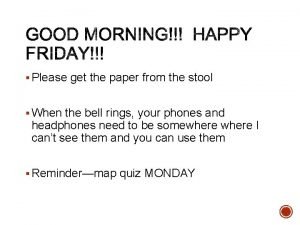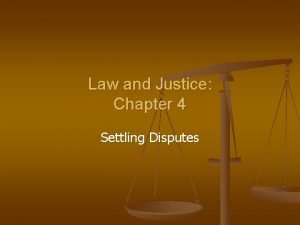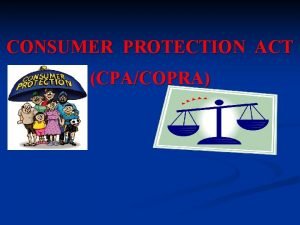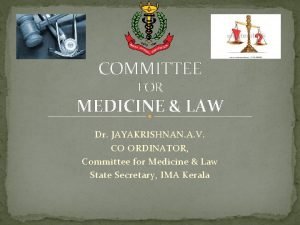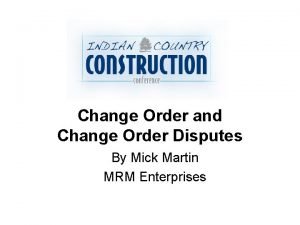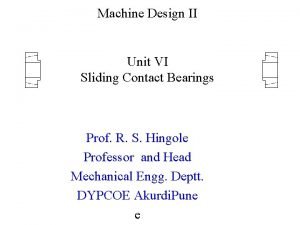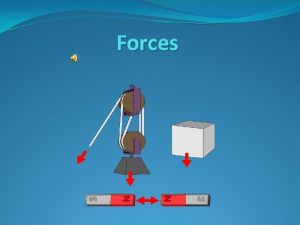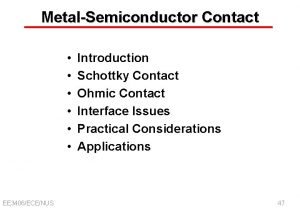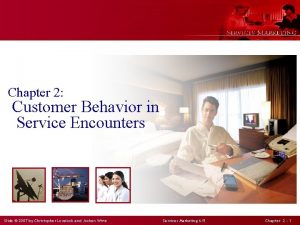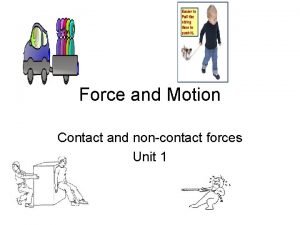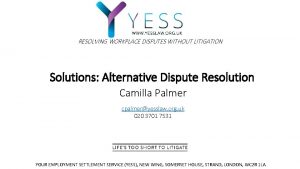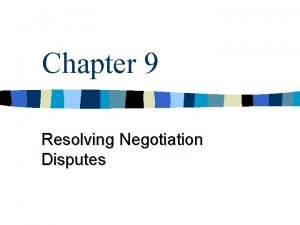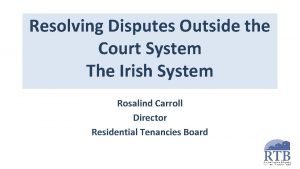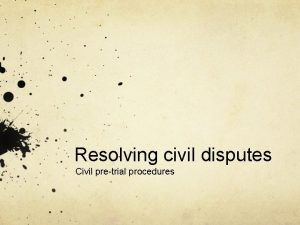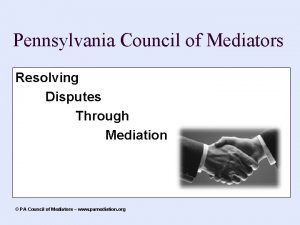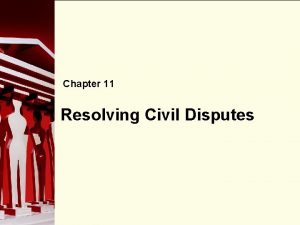Resolving Health Care Disputes contact information for presenter
![Resolving Health Care Disputes [contact information for presenter] Resolving Health Care Disputes [contact information for presenter]](https://slidetodoc.com/presentation_image_h2/c8226828304abf8edc8ed5eec50d5cf8/image-1.jpg)
















- Slides: 17
![Resolving Health Care Disputes contact information for presenter Resolving Health Care Disputes [contact information for presenter]](https://slidetodoc.com/presentation_image_h2/c8226828304abf8edc8ed5eec50d5cf8/image-1.jpg)
Resolving Health Care Disputes [contact information for presenter]

Overview What is arbitration? What is mediation? What benefits can these processes provide? How do I use these processes most effectively?

What is Arbitration? Private adjudication: The parties agree that a particular dispute, or a range of disputes, will be decided by an impartial expert after a private hearing rather than by a judge or jury after a public trial. 3

Potential Benefits Confidentiality • • Existence of dispute Allegations and demands Pleadings, testimony, and evidence Outcome Speed/Finality • • Reduced discovery and motions practice No court backlog for hearings Deadline for issuing award Very limited grounds for vacating (overturning) an award 4

Potential Benefits (cont. ) Fairness/Predictability • Decision-maker with subject matter expertise • Settlement easier to negotiate when outcome is more certain Cost: Savings in legal fees may far exceed costs of arbitrator and administrator 5

Barriers to Success Confidentiality Litigation to compel arbitration and/or to enforce award Speed/Cost A panel (3 arbitrators) instead of a single arbitrator Turning arbitration into litigation • filing every conceivable motion • engaging in full-blown discovery • requiring adherence to judicial rules of evidence Fairness/Finality A one-sided arbitration agreement that is deemed unconscionable or contrary to public policy 6

Best Practices Restrict use of panels to very large cases Set clear expectations for advocates • • • Get to the heart of the dispute quickly Do not advance every conceivable argument Do not try every conceivable tactical ploy Do not bury the other side in unnecessary discovery requests Do not resist requests for relevant information Set clear expectations for clients • You may have to pay money to get sued • You may have to pay for an award that goes against you • You may not get the arbitrator you want and you cannot control the process even though you are paying for it 7

What is Mediation? Assisted negotiation: An impartial expert tries to help the parties overcome barriers to agreement such as strong emotions, breakdowns in communication, competing views about the facts and applicable law, and differing predictions about how a judge or jury will rule if the case is tried in court. 8

Why Mediate? • Can be much faster and less expensive than arbitration (or litigation) • Just as confidential as arbitration • Final 75 -85% of the time (if voluntary) • No loss of control • Can preserve or improve relationships 9

Best Practices for Mediation Make it happen Problem • Advocates are reluctant to propose mediation for fear of appearing weak. Solutions • Contract clause that requires parties to mediate and prohibits either party from initiating arbitration or litigation during 30 or 60 day window reserved for mediation. • Corporate policy that requires advocates to propose mediation in every case. 10

Best Practices for Mediation (cont. ) Be prepared • Train lawyers and clients in mediation advocacy • Trial lawyers often try to turn mediation into what they are familiar and comfortable with: trial • Clients need to know what to expect and what is expected of them • Clients need to see the value of mediating even if they perceive the other side’s case as weak 11

Using the Dispute Resolution Service Arbitration • Claim form on AHLA website • Low filing fees ($900 -$1, 700 for two party case) • No other fees except for arbitrator’s time and expenses Mediation • No fees except for mediator’s time and expenses • No rules, just agreement to mediate • Flexibility about how mediator is selected 12

Basic pre-dispute clause: Any dispute arising out of or relating to this contract or the subject matter thereof, or any breach of this contract, including any dispute regarding the scope of this clause, will be resolved through arbitration administered by the American Health Lawyers Association Dispute Resolution Service and conducted pursuant to the AHLA Rules of Procedure for Arbitration. Judgment on the award may be entered and enforced in any court having jurisdiction. Guide to Arbitration Clauses on AHLA website 13

AHLA Roster of Neutrals National roster of • arbitrators • mediators • peer review hearing officers with health law and health care expertise Becoming a neutral: • No cost to join or remain on the roster • AHLA retains 18% of the amount billed and collected on behalf of neutrals (we don’t make money unless you make money) • Training in how to arbitrate and mediate health care disputes • Online application, instructions, and minimum requirements on Neutrals page of AHLA website https: //www. americanhealthlaw. org/dispute-resolution-services/servingas-a-neutral. Administrative support and use of electronic case management system 14

Contact Information Geoff Drucker | Senior Director, Dispute Resolution Service American Health Law Association 1099 14 th Street NW, Suite 925 Washington, DC 20005 (202) 833 -6945 Email: GDrucker@americanhealthlaw. org Carine Brice | Manager, Dispute Resolution Service American Health Law Association 1099 14 th Street NW, Suite 925 Washington, DC 20005 (202) 833 -0762 Email: CBrice@americanhealthlaw. org Robin Carter| Case Administrator American Health Law Association 1099 14 th Street NW, Suite 925 Washington, DC 20005 (202) 833 -6958 Email: RCarter@americanhealthlaw. org 15

We Are AHLA Our Vision To lead health law to excellence through education, information, and dialogue. Our Mission To provide a collegial forum for interaction and information exchange to enable its members to serve their clients more effectively; to produce the highest quality, nonpartisan, educational programs, products, and services concerning health law issues; and to serve as a public resource on selected health care legal issues. Diversity and Inclusion In principle and in practice, the American Health Law Association values and seeks to advance and promote diverse and inclusive participation within the Association regardless of gender, race, ethnicity, religion, age, sexual orientation, gender identity and expression, national origin, or disability. Guided by these values, the Association strongly encourages and embraces participation of diverse individuals as it leads health law to excellence through education, information, and dialogue.

© 2021 is published by the American Health Law Association. All rights reserved. No part of this publication may be reproduced in any form except by prior written permission from the publisher. Printed in the United States of America. Any views or advice offered in this publication are those of its authors and should not be construed as the position of the American Health Law Association. “This publication is designed to provide accurate and authoritative information in regard to the subject matter covered. It is provided with the understanding that the publisher is not engaged in rendering legal or other professional services. If legal advice or other expert assistance is required, the services of a competent professional person should be sought” —from a declaration of the American Bar Association.
 Examples of locational boundary disputes
Examples of locational boundary disputes Evolution of the contemporary political pattern
Evolution of the contemporary political pattern Allocational boundary definition
Allocational boundary definition Why might fishing disputes arise in the region?
Why might fishing disputes arise in the region? Chapter 4 settling disputes
Chapter 4 settling disputes Anatomy of industrial disputes
Anatomy of industrial disputes Consumer disputes redressal agencies
Consumer disputes redressal agencies Consumer disputes redressal agencies
Consumer disputes redressal agencies Change order disputes
Change order disputes Examples of non contact force
Examples of non contact force Advantages and disadvantages of sliding contact bearing
Advantages and disadvantages of sliding contact bearing Which is a contact force? *
Which is a contact force? * Which force is a noncontact force?
Which force is a noncontact force? Irritant vs contact dermatitis
Irritant vs contact dermatitis Is air resistance a contact or noncontact force
Is air resistance a contact or noncontact force What is dangling bond
What is dangling bond Need a service chapter 2
Need a service chapter 2 What are some contact forces and some noncontact forces?
What are some contact forces and some noncontact forces?


